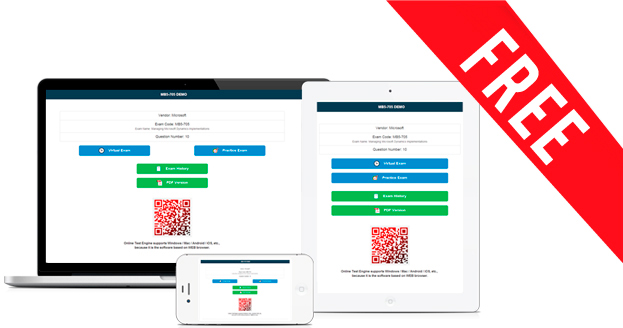安全具有保證的 NetSec-Analyst 題庫資料
在談到 NetSec-Analyst 最新考古題,很難忽視的是可靠性。我們是一個為考生提供準確的考試材料的專業網站,擁有多年的培訓經驗,Palo Alto Networks NetSec-Analyst 題庫資料是個值得信賴的產品,我們的IT精英團隊不斷為廣大考生提供最新版的 Palo Alto Networks NetSec-Analyst 認證考試培訓資料,我們的工作人員作出了巨大努力,以確保考生在 NetSec-Analyst 考試中總是取得好成績,可以肯定的是,Palo Alto Networks NetSec-Analyst 學習指南是為你提供最實際的認證考試資料,值得信賴。
Palo Alto Networks NetSec-Analyst 培訓資料將是你成就輝煌的第一步,有了它,你一定會通過眾多人都覺得艱難無比的 Palo Alto Networks NetSec-Analyst 考試。獲得了 Network Security Administrator 認證,你就可以在你人生中點亮你的心燈,開始你新的旅程,展翅翱翔,成就輝煌人生。
選擇使用 Palo Alto Networks NetSec-Analyst 考古題產品,離你的夢想更近了一步。我們為你提供的 Palo Alto Networks NetSec-Analyst 題庫資料不僅能幫你鞏固你的專業知識,而且還能保證讓你一次通過 NetSec-Analyst 考試。
購買後,立即下載 NetSec-Analyst 題庫 (Palo Alto Networks Network Security Analyst): 成功付款後, 我們的體統將自動通過電子郵箱將您已購買的產品發送到您的郵箱。(如果在12小時內未收到,請聯繫我們,注意:不要忘記檢查您的垃圾郵件。)
Palo Alto Networks NetSec-Analyst 考試大綱:
| 主題 | 簡介 |
|---|
| 主題 1 | - Object Configuration Creation and Application: This section of the exam measures the skills of Network Security Analysts and covers the creation, configuration, and application of objects used across security environments. It focuses on building and applying various security profiles, decryption profiles, custom objects, external dynamic lists, and log forwarding profiles. Candidates are expected to understand how data security, IoT security, DoS protection, and SD-WAN profiles integrate into firewall operations. The objective of this domain is to ensure analysts can configure the foundational elements required to protect and optimize network security using Strata Cloud Manager.
|
| 主題 2 | - Troubleshooting: This section of the exam measures the skills of Technical Support Analysts and covers the identification and resolution of configuration and operational issues. It includes troubleshooting misconfigurations, runtime errors, commit and push issues, device health concerns, and resource usage problems. This domain ensures candidates can analyze failures across management systems and on-device functions, enabling them to maintain a stable and reliable security infrastructure.
|
| 主題 3 | - Policy Creation and Application: This section of the exam measures the abilities of Firewall Administrators and focuses on creating and applying different types of policies essential to secure and manage traffic. The domain includes security policies incorporating App-ID, User-ID, and Content-ID, as well as NAT, decryption, application override, and policy-based forwarding policies. It also covers SD-WAN routing and SLA policies that influence how traffic flows across distributed environments. The section ensures professionals can design and implement policy structures that support secure, efficient network operations.
|
| 主題 4 | - Management and Operations: This section of the exam measures the skills of Security Operations Professionals and covers the use of centralized management tools to maintain and monitor firewall environments. It focuses on Strata Cloud Manager, folders, snippets, automations, variables, and logging services. Candidates are also tested on using Command Center, Activity Insights, Policy Optimizer, Log Viewer, and incident-handling tools to analyze security data and improve the organization overall security posture. The goal is to validate competence in managing day-to-day firewall operations and responding to alerts effectively.
|
參考:https://www.paloaltonetworks.com/content/dam/pan/en_US/assets/pdf/datasheets/education/netsec-analyst-datasheet.pdf
免費一年的 NetSec-Analyst 題庫更新
為你提供購買 Palo Alto Networks NetSec-Analyst 題庫產品一年免费更新,你可以获得你購買 NetSec-Analyst 題庫产品的更新,无需支付任何费用。如果我們的 Palo Alto Networks NetSec-Analyst 考古題有任何更新版本,都會立即推送給客戶,方便考生擁有最新、最有效的 NetSec-Analyst 題庫產品。
通過 Palo Alto Networks NetSec-Analyst 認證考試是不簡單的,選擇合適的考古題資料是你成功的第一步。因為好的題庫產品是你成功的保障,所以 Palo Alto Networks NetSec-Analyst 考古題就是好的保障。Palo Alto Networks NetSec-Analyst 考古題覆蓋了最新的考試指南,根據真實的 NetSec-Analyst 考試真題編訂,確保每位考生順利通過 Palo Alto Networks NetSec-Analyst 考試。
優秀的資料不是只靠說出來的,更要經受得住大家的考驗。我們題庫資料根據 Palo Alto Networks NetSec-Analyst 考試的變化動態更新,能夠時刻保持題庫最新、最全、最具權威性。如果在 NetSec-Analyst 考試過程中變題了,考生可以享受免費更新一年的 Palo Alto Networks NetSec-Analyst 考題服務,保障了考生的權利。

NetSec-Analyst 題庫產品免費試用
我們為你提供通过 Palo Alto Networks NetSec-Analyst 認證的有效題庫,來贏得你的信任。實際操作勝于言論,所以我們不只是說,還要做,為考生提供 Palo Alto Networks NetSec-Analyst 試題免費試用版。你將可以得到免費的 NetSec-Analyst 題庫DEMO,只需要點擊一下,而不用花一分錢。完整的 Palo Alto Networks NetSec-Analyst 題庫產品比試用DEMO擁有更多的功能,如果你對我們的試用版感到滿意,那么快去下載完整的 Palo Alto Networks NetSec-Analyst 題庫產品,它不會讓你失望。
雖然通過 Palo Alto Networks NetSec-Analyst 認證考試不是很容易,但是還是有很多通過的辦法。你可以選擇花大量的時間和精力來鞏固考試相關知識,但是 Sfyc-Ru 的資深專家在不斷的研究中,等到了成功通過 Palo Alto Networks NetSec-Analyst 認證考試的方案,他們的研究成果不但能順利通過NetSec-Analyst考試,還能節省了時間和金錢。所有的免費試用產品都是方便客戶很好體驗我們題庫的真實性,你會發現 Palo Alto Networks NetSec-Analyst 題庫資料是真實可靠的。





 1046位客戶反饋
1046位客戶反饋













117.19.115.* -
他們說這是最新版本的,和真實的NetSec-Analyst考試幾乎一樣,毫無疑問通過了。